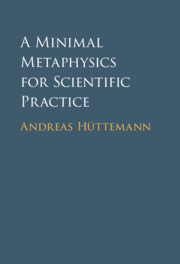
-
Select format
-
- Publisher:
- Cambridge University Press
- Publication date:
- August 2021
- July 2021
- ISBN:
- 9781009023542
- 9781316519394
- 9781009010436
- Dimensions:
- (228 x 152 mm)
- Weight & Pages:
- 0.5kg, 242 Pages
- Dimensions:
- (229 x 152 mm)
- Weight & Pages:
- 0.356kg, 242 Pages
You may already have access via personal or institutional login
Book description
What are the metaphysical commitments which best 'make sense' of our scientific practice (rather than our scientific theories)? In this book, Andreas Hüttemann provides a minimal metaphysics for scientific practice, i.e. a metaphysics that refrains from postulating any structure that is explanatorily irrelevant. Hüttemann closely analyses paradigmatic aspects of scientific practice, such as prediction, explanation and manipulation, to consider the questions whether and (if so) what metaphysical presuppositions best account for these practices. He looks at the role which scientific generalisation (laws of nature) play in predicting, testing, and explaining the behaviour of systems. He also develops a theory of causation in terms of quasi-inertial processes and interfering factors, and he proposes an account of reductive practices that makes minimal metaphysical assumptions. His book will be valuable for scholars and advanced students working in both philosophy of science and metaphysics.
Reviews
‘A Minimal Metaphysics for Scientific Practice constitutes a highly original contribution to the burgeoning field of the metaphysics of science. Clear, well-argued and ambitious in scope, it will be required reading for those seeking cutting-edge work on such issues as laws, causation, reductionism and fundamentality.'
Travis Dumsday - Concordia University of Edmonton
Contents
Metrics
Altmetric attention score
Full text views
Full text views help Loading metrics...
Loading metrics...
* Views captured on Cambridge Core between #date#. This data will be updated every 24 hours.
Usage data cannot currently be displayed.
Accessibility standard: Unknown
Why this information is here
This section outlines the accessibility features of this content - including support for screen readers, full keyboard navigation and high-contrast display options. This may not be relevant for you.
Accessibility Information
Accessibility compliance for the PDF of this book is currently unknown and may be updated in the future.


